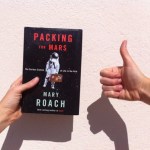Technology
As reported in today's Science Times of The New York Times, a research group in Taiwan led by Dr. Ann-Shyn Chiang has accomplished something that was unimaginable when I was a graduate student in the 1980's: they have created the first atlas of the brain of a fruit fly at the resolution of a single neuron! Using cloning techniques and a protein that appears green under certain conditions, they have created three dimensional images of neurons one at a time from a large collection of fruit fly brains and merged the images into a single "atlas".
Some quick facts:
The fruit fly has about 100,…
We live in an age where truth is, if not stranger than fiction, then at least equally strange. Sometimes pop-science books illustrate this point with particular well-researched glee and Packing for Mars: The Curious Science of Life in the Void is such a book.
Where do I begin? It's a true nerd's smorgasbord. It answers all the scatological and emotional questions that kids always imprudently ask astronauts. It acknowledges the humanness of space travel as a venture: that astronauts are people who must eat, pass gas, have sex, take up space, sweat, sleep, fear, and otherwise learn to be…
Registered users of Gawker.com media sites have had their names, email addresses, reading histories, and passwords stolen. But that's OK, because just yesterday I heard you say that any information hackers steal from secret computer databases should be public. (Or did I hear you wrong?)
The hacking appears to have been done by one of the same groups of "Hactivists" that is sucking up to Wikileaks and the largely directionless and infantile Internet anarchist community. [No, wait, probably not. Updated.]
This is all unfolding rather quickly, and you can get updated at least through…
Sometimes, when I take a step back and look at the ways that we can manipulate life, I'm astounded. We can breed mice that lack any gene we want. We can also insert new genes, and have them only express in certain types of cells or only at certain times. This is routine. We can make design viruses to insert genes into human cells to cure, cure debilitating diseases.
We have bacteria that play sudoku, and we have mice born with two fathers. We can make corn express toxins from Bacillus that only kill pests, and tobacco and cats that glow green (through two different mechanisms even).
Our…
How come we don't all have one of these? I suppose one possible down side would be that if you fell off it would drag you into the vortex and crush you. But still ... well, have a look:
The ceremony of Liu Xiaobo's Nobel Peace Prize was filled with symbolism, as the award was placed in an empty chair as the recipient remained in prison for, as some say, expressing his civil rights. Liu Xiaobo embodies the pursuit of freedom within a communist system that by definition constrains personal freedom and realization of personal achievement. As I listened to coverage by PBS's NewsHour, the role of technology in the realization of human rights came into focus. While the Chinese government "blocked television coverage of the event and clamped down on Internet communications…
OK, I bow to popular opinion: almost 100 people have sent me a link to this story about a prosthetic tentacle. It's a brilliant idea, but I don't know anyone who has lost a limb who would suggest that their prosthesis is even an adequate alternative. It's a little insensitive to swoon over one, then…but still, I like the idea of going outside the bounds of the human model to come up with a solution.
But I wouldn't be satisfied until it had full sensorimotor integration and color-changing technology.
Or is it a 'Holiday' miracle now? Anyway...
Finally, Congress passes a piece of legislation that citizens on both the right and left side of the political spectrum can get behind. Late yesterday, Congress approved the CALM (Commercial Advertising Loudness Mitigation) Act, which "requires TV advertisers to ensure their ads don't play at a volume louder than regular TV programming." The new bill requires ad makers to use "industry technology" to prevent the volume annoyance from occurring.
I CAN NOT WAIT!
Oh and Obama better pass it. I'll be very upset if he doesn't.
This group can build a 3D model from millions of flickr images from any city/location/public restroom. Amazing!
Scholars at the University of North Carolina at Chapel Hill have developed a method for creating 3D models of pretty much anything in pretty much no time.
Using a sexy algorithm and the millions of photographs available from Flickr, the team can create a sophisticated three-dimensional model on a single personal computer in under a day.
Check out the video:
... like clockwork. Orange that is.
Or perhaps 1984 is a better analogy, and that would be rather poignant, considering that Apple is said to have made a huge initial impact years ago with its anti-1984 ad.
We should have known then that a company using 1984 as a means of selling itself would eventually develop into its own Orwellian nightmare.
The latest?
... a representative from developer relations informed the CEO of Mediaprovider, a small magazine publisher based in Denmark, that he couldn't put a magazine about Google's (GOOG) Android on the App Store.
According to Mediaprovider'…
Kevin Drum posted an anti-rant about the TSA, which argues that the new scanners and pat-downs aren't an outrage because they really mean well:
I'm not trying to defend everything TSA has put in place. Some of the stuff they do, like the penknife and nail clipper bans, really is stupid. And maybe backscatter scanners don't work. I'm certainly open to the idea. But honestly, most of what they do is pretty easy to understand: they're trying to make it so hard to get weapons and explosives on board airplanes that no one bothers trying -- and the few who do can't pack a big enough punch to do any…
This is just awesome:
A strain of Escherichia coli bacteria can now solve [sudoku] puzzles
[...]
"Because sudoku has simple rules, we felt that maybe bacteria could solve it for us, as long as we designed a circuit for them to follow," says team leader Ryo Taniuchi.
The mechanism is ingenious and yet straightforward at the same time.
Basically, they have 16 different strains of bacteria, with each initial strain representing a spatial coordinate on a 4x4 grid. Each bacterium has a "4C3 leak" system, which is a chunk of DNA that the team designed that has 4 possible outputs. Depending on…
A few months ago, I attended Cyborg Camp in my hometown of Portland, Oregon. Cyborg Camp is an "unconference," basically a room full of cyberpunks, mega-nerds, and aspirational coders that gather in an office building to talk about the "future of the relationship between humans and technology." This event deserves a separate entry, but for now I'd like to recall a particularly evocative thing: that the most heartbreaking thing I saw at Cyborg Camp was an adult man hopelessly tangled in a web of cables.
It was his own off-the-shelf wearable computing system, a gordian thing connecting his…
After the total votes were added up in the big GMO debate, the Economist scores it 62% against biotechnology, 38% for biotechnology. They also explain that there was a huge turnout and that there was a lot of active campaigning for particular views.
The voting has shifted dramatically during this debate, starting out heavily in favour of the motion, swinging strongly in the other direction (seemingly in response to an organised campaign by anti-GM activists), and then swinging back towards the middle. But in the end the opponents of biotechnology—or, more precisely, the opponents of genetic…
No, wait ... not exactly. Well, sort of.
We all thought Facebook would be announcing Facebook.com, the email server to end all googles. But instead it launched something else. It is called a "Modern Messaging System" and it combines email, instant messages, and SMS.
Hold on, I'll be right back.
OK, I looked up SMS because I didn't know what that was. It's texting.
There are exactly two people with whom I regularly text, and by regularly I mean an average of something like one message per ... week. But my phone system does not support more than a few free ones, so I think I like the…
Maybe.
Just the other day I was thinking that I'd love pop mail access to my facebook "email" account. Facebook "email" is annoying and broken as an email service, but then again, it is not supposed to be an email service, is it?
Untill it is. Facebook will probably, according to rumors on the intertubes, roll out a revamp of its "inbox" which will make facebook email work with something like yourusername@facebook.com and generally behave like a mail server. Then, I will be able to access my facebook mail with alpine! Monday. It's all going to happen on Monday.
There's a new physics Q&A site from the folks at Stack Exchange, this one on physics. If you're not familiar with the format, it's a bulletin-board style site where you can post questions to be answered by other users, and people vote the answers up and down, so you can get a decent feel for which answers are good, and which are less useful.
There's a pretty wide range of questions, covering everything from really basic concepts to fairly technical questions about current research. My own feeling about this is that if you're going to have it on the public web, you ought to expect and be…
I wrote earlier of the very useful command line utility called gcalcli (short for GoogleCALendarCommandLineInterface). Click here to read that post. One of the options is called "agenda" which spits out, by default, the next five days of calendar entries. If you would prefer a different range of time than five days, then you can specify two dates and the utility will give you that set of entries.
But I find that to be a bit of a pain, typing in the dates to start and end the list, when I generally want a quick and dirty "next several days." That, I suppose, is why there is a default of…
There have been a bunch of interesting things written about education recently that I've been too busy teaching to comment on. I was pulling them together this morning to do a sort of themed links dump, when the plot at the right, from Kevin Drum's post about school testing jumped out at me. This shows test scores for black students in various age groups over time, but more importantly, it demonstrates one of my pet peeves about Excel.
If you look at the horizontal axis of this plot, it shows regularly spaced intervals. If you actually read the labels, though, you'll see that they're anything…
The author, dishing.
To get to the National Radio Telescope Observatory, you have to be committed.
Well, first, you have to be in New Mexico -- about an hour's drive south of Albuquerque, in the plains of San Augustin, to be precise, a Pleistocene lakebed bordered by the northern end of the Chihuahuan Desert and dotted with arid shrubs. Despite being some 6,970 feet above sea level, it feels like the basement of the world, wide and flat and under the massive Southwestern sky. Driving to the Observatory, the home of the famous "Very Large Array" of radio telescopes, is an exercise in…




